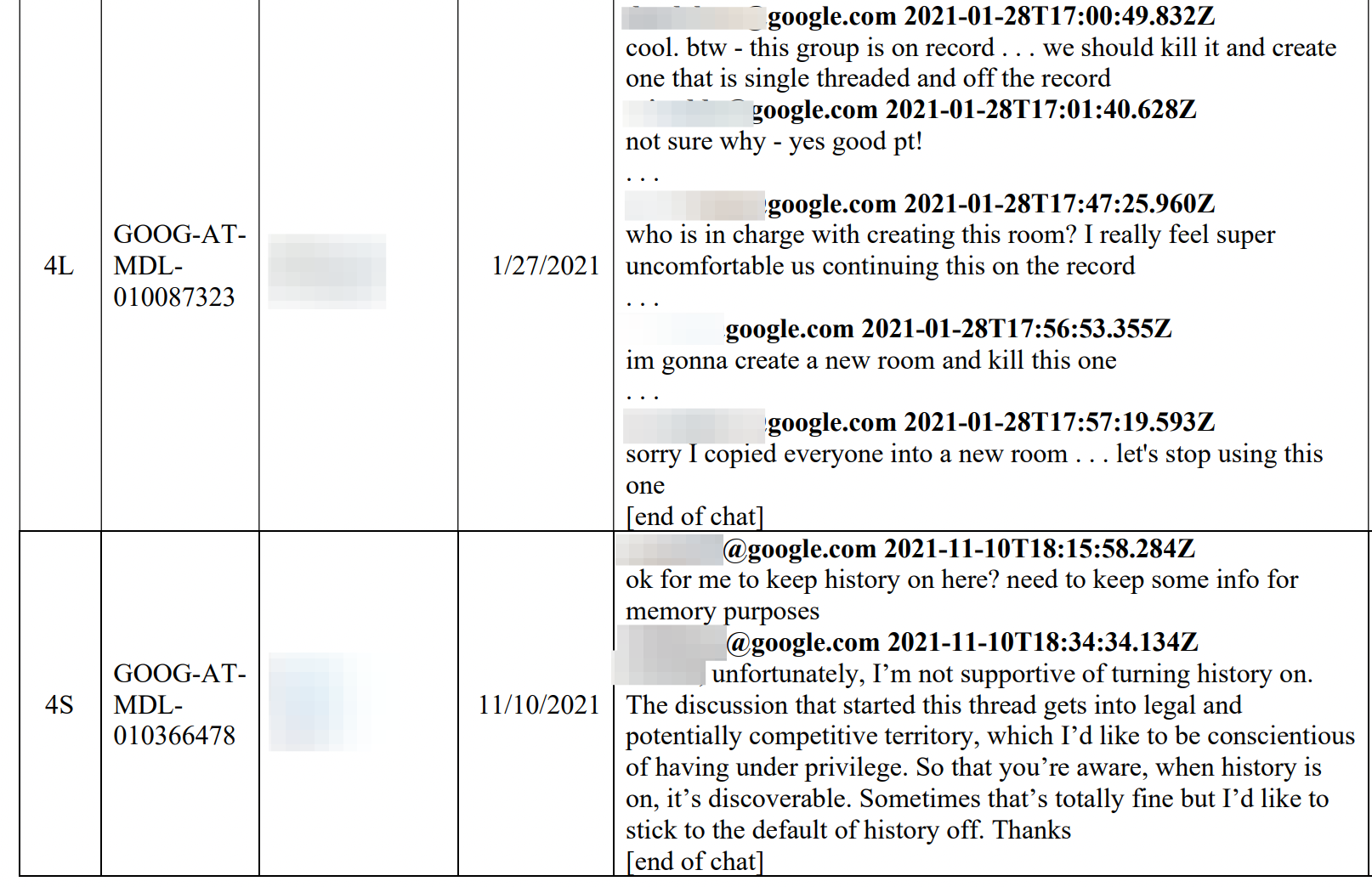This article was produced in collaboration with Court Watch, an independent outlet that unearths overlooked court records. To subscribe to Court Watch, click here.
In its antitrust case against Google, the Federal Government filed a list of chats it had obtained that show Google employees explicitly asking each other to turn off a chat history feature to discuss sensitive subjects, showing repeatedly that Google workers understood they should try to avoid creating a paper trail of some of their activities.
The filing came following a hearing in which judge Leonie Brinkema ripped Google for “destroyed” evidence while considering a filing from the Department of Justice asking the court to find “adverse interference” against Google, which would allow the court to assume it purposefully destroyed evidence. Previous filings, including in the Epic Games v Google lawsuit and this current antitrust case, have also shown Google employees purposefully turning history off.
The chats show 22 instances in which one Google employee told another Google employee to turn chat history off. In total, the court has dozens of specific employees who have told others to turn history off in DMs or broader group chats and channels. The document includes exchanges like this (each exchange includes different employees):
Employee 1: “btw you might want to turn your chat history off”
Employee 2: “geez . . . for sure! . . . thank you! [end of chat]
and
Employee 1: “Please keep history off on this legally sensitive chat room”
Employee 2: “who all have we debriefed in legal?” [end of chat]
and
Employee 1: “do you know if our pings are privileged/discoverable?”
Employee 2: “we should turn history off” [end of chat]
and
Employee 1: “ok team false start - by the IRC semantics of chat Rooms, History remains ON - so I’m going to kill this room and re-create as a group chat with History OFF. sorry about that [end of chat]
and
Employee 1: “pls turn off history”
and
Employee 1: “What is the history status of this group?”
and
Employee 1: “ugh pl [sic] stop this chat, for some reason History is on”
and
Employee 1: “ok for me to keep history on here? need to keep some info for memory purposes”
Employee 2: “unfortunately, I’m not supportive of turning history on. The discussion that started this thread gets into legal and potentially competitive territory, which I’d like to be conscientious of having under privilege. So that you’re aware, when history is on, it’s discoverable. Sometimes that’s totally fine but I’d like to stick to the default of history off. Thanks.”

The chats explicitly show Google employees deliberately trying to avoid creating chat logs that would have been “discoverable” by the court in a lawsuit, and are also an attempt to assert attorney-client privilege before any lawsuit was filed, which is a legal doctrine in which certain conversations between an attorney and their client cannot be used as evidence in court. More broadly, they show Google practicing the teachings of “The Walker Memo,” a “HIGHLY CONFIDENTIAL” internal Google document about the “Google Chat Retention Policy” that was circulated at the company and which explains how long chats will be saved under certain settings.
“Google's success depends on making sure that we safeguard our information, keep critical business content for the appropriate amount of time, and discard materials that are no longer necessary,” the memo reads. “We do this by keeping only timely, meaningful and useful data, while reducing redundant, obsolete, or trivial information, such as chat messages not intended to be kept past their initial transmission (similar to a telephone call or in-person conversation).”
Google has also told employees to “communicate with care,” according to documents filed in the case, which included instructions to try to CC lawyers on emails often in an attempt to put that communication under attorney/client privilege: “lawyer in ‘to’ field, mark ‘Attorney/Client Privileged,’ ‘ask the lawyer a question.’”
According to antitrust expert Matt Stoller of the American Economic Liberties Project, who attended a hearing earlier this week in the case, Judge Leonie Brinkema has said she believes Google has given its employees a “‘wink and a nod’ instruction to employees not to retain evidence.”
“Since 2008, Google has systemically destroyed evidence relating to antitrust investigations,” Stoller tweeted. “And judges are beginning to hold Google accountable.”


